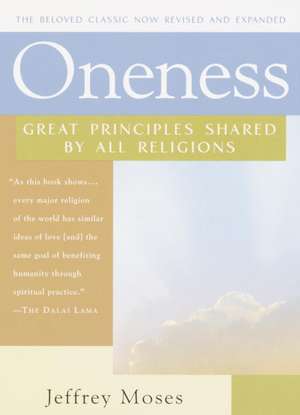Oneness: Great Principles Shared by All Religions
Autor Jeffrey Mosesen Limba Engleză Paperback – 30 sep 2002
and the eternal truths shared by all religions.
Judaism, Christianity, Buddhism, Islam: the world’s religions all seem to ask that their followers seek different paths to enlightenment. Yet beneath the seeming differences lies a pool of universal truth. Oneness collects these beliefs together in one volume, in the actual words of each religion’s scriptures. These universal principles—The Golden Rule . . . Honor Thy Father and Thy Mother . . . Heaven Is Within . . . As We Sow, We Shall Reap . . . Judge Not . . . God Is Love, and others—guide us to inner peace, and allow us to achieve spiritual richness. Oneness is a gift of love.
Preț: 104.36 lei
Nou
Puncte Express: 157
Preț estimativ în valută:
19.97€ • 20.82$ • 16.60£
19.97€ • 20.82$ • 16.60£
Carte disponibilă
Livrare economică 27 februarie-13 martie
Preluare comenzi: 021 569.72.76
Specificații
ISBN-13: 9780345457639
ISBN-10: 0345457633
Pagini: 256
Dimensiuni: 132 x 178 x 15 mm
Greutate: 0.18 kg
Ediția:Rev and Expande
Editura: BALLANTINE BOOKS
ISBN-10: 0345457633
Pagini: 256
Dimensiuni: 132 x 178 x 15 mm
Greutate: 0.18 kg
Ediția:Rev and Expande
Editura: BALLANTINE BOOKS
Extras
The Golden Rule
The Golden Rule is the cornerstone of religious understanding. It is the most complete expression of the Oneness of all people, serving as the foundation for peace and universal goodwill on earth.
The Golden Rule is expressed almost word for word in every religion. So fundamental is it to all religious thought that the founders and enlightened teachers of every religion have commented on it directly.
Jesus referred to the Golden Rule as "the law and the prophets." Mohammed described it as "the noblest expression of religion." Rabbi Hillel stated in the Jewish Talmud that the Golden Rule is "the whole of the Torah and the remainder is but commentary." Vyasa, the enlightened Hindu sage, called it "the sum of all true righteousness." Similarly, Buddha referred to it as "the sum total of all righteousness." And Confucius, the great Chinese master, deemed it "the one principle upon which one's whole life may proceed."
Many people are taught from childhood that living the Golden Rule is an ideal, without emphasizing the practical benefits. When people look upon others as extensions of themselves, all obstacles to fulfillment are removed-both for individuals and society. When the goals of every individual are supported by the activities of every other person, the world has the possibility to flourish in peace and prosperity. For this reason, the Golden Rule should not be thought of as a vague ideal. It is a practical principle that embodies the deepest aspirations of humanity. It serves as the basis for all that is positive and lasting in human life.
Y
The Golden Rule
Do unto others as you would have them do unto you, for this is the law and the prophets.
Christianity
What is hurtful to yourself do not to your fellow man. That is the whole of the Torah and the remainder is but commentary.
Judaism
Do unto all men as you would they should unto you, and reject for others what you would reject for yourself.
Islam
Hurt not others with that which pains yourself.
Buddhism
The Golden Rule
Tzu Kung asked: "Is there any one principle upon which one's whole life may proceed?" Confucius replied: "Is not Reciprocity such a principle?-what you do not yourself desire, do not put before others."
Confucianism
This is the sum of all true righteousness-
Treat others, as thou wouldst thyself be treated.
Do nothing to thy neighbor, which hereafter
Thou wouldst not have thy neighbor do to thee.
Hinduism
Treat others as thou wouldst be treated thyself.
Sikhism
A man should wander about treating all creatures as he himself would be treated.
Jainism
Regard your neighbor's gain as your own gain; and regard your neighbor's loss as your own loss, even as though you were in their place.
Taoism
Ascribe not to any soul that which thou wouldst not have ascribed to thee.
The Golden Rule is the cornerstone of religious understanding. It is the most complete expression of the Oneness of all people, serving as the foundation for peace and universal goodwill on earth.
The Golden Rule is expressed almost word for word in every religion. So fundamental is it to all religious thought that the founders and enlightened teachers of every religion have commented on it directly.
Jesus referred to the Golden Rule as "the law and the prophets." Mohammed described it as "the noblest expression of religion." Rabbi Hillel stated in the Jewish Talmud that the Golden Rule is "the whole of the Torah and the remainder is but commentary." Vyasa, the enlightened Hindu sage, called it "the sum of all true righteousness." Similarly, Buddha referred to it as "the sum total of all righteousness." And Confucius, the great Chinese master, deemed it "the one principle upon which one's whole life may proceed."
Many people are taught from childhood that living the Golden Rule is an ideal, without emphasizing the practical benefits. When people look upon others as extensions of themselves, all obstacles to fulfillment are removed-both for individuals and society. When the goals of every individual are supported by the activities of every other person, the world has the possibility to flourish in peace and prosperity. For this reason, the Golden Rule should not be thought of as a vague ideal. It is a practical principle that embodies the deepest aspirations of humanity. It serves as the basis for all that is positive and lasting in human life.
Y
The Golden Rule
Do unto others as you would have them do unto you, for this is the law and the prophets.
Christianity
What is hurtful to yourself do not to your fellow man. That is the whole of the Torah and the remainder is but commentary.
Judaism
Do unto all men as you would they should unto you, and reject for others what you would reject for yourself.
Islam
Hurt not others with that which pains yourself.
Buddhism
The Golden Rule
Tzu Kung asked: "Is there any one principle upon which one's whole life may proceed?" Confucius replied: "Is not Reciprocity such a principle?-what you do not yourself desire, do not put before others."
Confucianism
This is the sum of all true righteousness-
Treat others, as thou wouldst thyself be treated.
Do nothing to thy neighbor, which hereafter
Thou wouldst not have thy neighbor do to thee.
Hinduism
Treat others as thou wouldst be treated thyself.
Sikhism
A man should wander about treating all creatures as he himself would be treated.
Jainism
Regard your neighbor's gain as your own gain; and regard your neighbor's loss as your own loss, even as though you were in their place.
Taoism
Ascribe not to any soul that which thou wouldst not have ascribed to thee.
Recenzii
“As this book shows . . . every major religion of the world has similar ideas of love [and] the same goal of benefiting humanity through spiritual practice.”
—The Dalai Lama
“An impressive array of selections. They show common ethics that transcend the narrow confines of sectarianism.”
—Atlanta Journal-Constitution
“Brilliant . . . [A] very important book.”
—Jewish Civic Press
—The Dalai Lama
“An impressive array of selections. They show common ethics that transcend the narrow confines of sectarianism.”
—Atlanta Journal-Constitution
“Brilliant . . . [A] very important book.”
—Jewish Civic Press
Descriere
Beneath the seeming differences of all the world's great religions, lies a pool of universal truth. "Oneness" collects these beliefs together for the first time, in the actual words of each religion's scriptures. These universal principles act as a guide to inner development, and allow each individual to achieve spiritual richness.
Notă biografică
Jeffrey Moses











